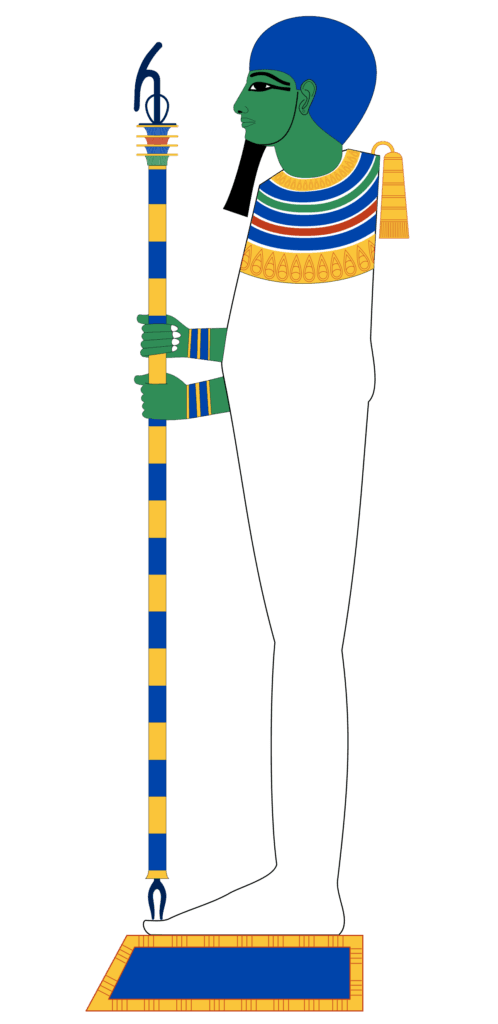
Ptah played a crucial role in ancient Egyptian mythology as a creator god. Revered for his craftsmanship, architecture, and wisdom, his influence spread across Egypt. His cult centre in Memphis remained significant throughout history, attracting followers from all walks of life.
Who Was Ptah?
As a major deity in the Egyptian pantheon, he often appeared as a mummified man with a straight beard, wearing a tight-fitting cloak. He carried a staff combining three powerful symbols: the ankh (life), the was sceptre (power), and the djed pillar (stability). These symbols emphasized his role in creation, strength, and order.
Ptah’s Role in Creation
According to Egyptian mythology, he created the world through thought and speech. Unlike other gods who physically shaped the universe, Ptah brought everything into existence through sheer will. The Memphite Theology describes how he conceived creation in his heart and spoke it into being. This belief highlights the power of words and wisdom in ancient Egyptian culture.
Patron of Craftsmen and Builders
Ptah served as the divine patron of artisans, sculptors, and builders. Those who constructed temples, statues, and monuments deeply revered him. As the god of craftsmanship, he inspired skilled work and innovation. Many artisans honoured him, believing he guided their hands and minds as they created masterpieces.
Connection to Other Gods
Ptah shared strong ties with other deities. He married Sekhmet, the lion-headed goddess of war and healing, and together they had a son, Nefertum, the god of perfume and beauty. Some myths also combined Ptah with other gods, such as Sokar and Osiris, forming Ptah-Sokar-Osiris, a composite deity representing death, rebirth, and creation.
The Cult of Ptah in Memphis
Memphis, one of ancient Egypt’s most important cities, became the heart of Ptah’s worship. The grand Temple of Ptah stood there, drawing priests, rulers, and artisans. Pharaohs frequently paid homage to him, seeking his blessings for their rule and construction projects. His influence was so profound that Memphis earned the name “Het-ka-Ptah,” meaning “House of the Soul of Ptah.” Scholars believe this name later influenced the Greek word “Aegyptos,” which eventually became “Egypt.”
Working with Ptah
If you want to connect with Ptah, focus on creativity, craftsmanship, and wisdom. Offerings such as handcrafted items, incense, or written prayers can help establish a connection. Meditation on his attributes, especially his ability to bring thoughts into reality, can also be powerful. Setting up an altar with symbols of Ptah, such as ankh, was scepter, or djed pillar, can serve as a focal point for devotion. Artists, architects, and creators may seek his guidance for inspiration and skill in their work. By honoring Ptah’s attributes, you can embrace his wisdom and creative power in your life.
Ptah’s Legacy
Ptah remained a central figure in Egyptian history. His association with creation, craftsmanship, and wisdom ensured his lasting impact. Despite Egypt’s many changes over time, his presence as a powerful and benevolent god endured.
His story highlights the value of intellect, creativity, and stability in ancient Egyptian culture. Today, his legacy lives on through the magnificent structures and art created in his honor, a testament to his enduring influence in history.

